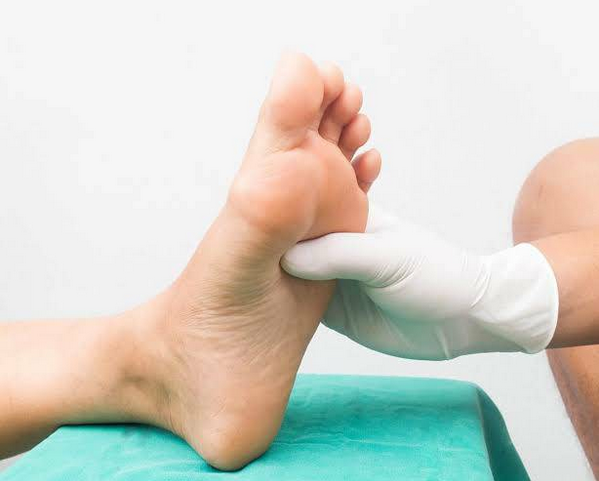
Treatment For Neuropathy / Diabetic Neuropathy
- Burning sense in feet, numbness in limbs are the alarming symptoms of neuropathy one should never ignor. This is peripheral neuropathy that affect the peripheral nervous system either due to diabetes called diabetic neuropathy or due to any compression at the root of particular nerve as seen in spondylosis/ disc bulge, brachial neuralgia, carpel tunnel syndrome or due to lack of blood suppy to specific area/ part of the body. Perpheral nerves can be rejuvenated and retrieviated back to earlier condition. The damaged neurons can be regenerated by specific ayurveda therapy and medication. If the neuropathy is due to diabetes then with special care and attention treatment for diabetes is administered paralelly and the blood sugar level is brought down with ayurvedic medicines.

Acquired Neuropathy:
Toxins, trauma, illness, or infection are examples of environmental factors that can cause acquired neuropathies.
- Diabetes
- Alcohol.
- Vitamin deficiency.
- Chemotherapy
- Thyroid or kidney disease
- Lyme /shingles and AIDS.
- Autoimmune and inflammatory conditions.
Hereditary Neuropathy: They are nerve diseases that are genetically passed down from parent to child. Charcot-Marie-Tooth disease type 1 is the most common of these.
Idiopathic Neuropathy: This is caused by an unknown factor. This classification system is used to classify up to one-third of all neuropathies.
The symptom types (with more about them below) are:
- Motor
- Sensory and pain
- Autonomic
Motor symptoms includes:
- Muscle weakness and paralysis : Nerve deterioration weakens the connected muscles which can cause paralysis.
- Muscle atrophy : Loss of nerve connection can cause muscles to shrink in size, as well as weaken.
- Uncontrolled muscle movements: Sometimes, nerves that lose their connection to the brain because of peripheral neuropathy become hyperactive on their own, causing cramps.
Sensory symptoms include:
- Tingling: This happens when there’s a problem with nerves that carry signals to your brain.
- Numbness: This happens when nerves can’t send or relay sensory signals, causing the loss of specific types of sensations.
- Imbalance and clumsiness: Nerves carry sensations that your brain uses to keep track of the location of your hands and feet. You’re not consciously aware of these sensations, but they’re critical for balance and coordination.
- Pain: Nerve damage can cause malfunctions when nerves send pain signals, making pain signals more intense (hyperalgesia) or happen too easily (allodynia). It can even cause nerves to generate pain signals spontaneously. This is known as “neuropathic” pain, and it’s the most noticeable and disruptive symptom of peripheral neuropathy.
Autonomic symptoms include:
- Blood pressure changes: Body automatically manages blood pressure, but damage to your peripheral nerves can disrupt this.
- Sweating too much or not enough: Body automatically manages its internal temperature, using sweating to shed heat. Peripheral nerve damage can cause you to sweat too much or not enough.
- Bowel and bladder problems: Nerve fibre disruption can affect bowel movements, and can occasionally affect bladder control, too.
- Sexual dysfunction: Autonomic nervous system controls sexual arousal.
- Other symptoms: Autonomic changes from peripheral neuropathy can also cause skin colour changes, swelling, changes in the pupils of the eyes and blurry vision.
The variability of symptoms caused by neuropathies frequently makes diagnosis difficult. A neuropathy diagnosis can include:
- Medical history
- Physical and neurological exams
- Body fluid tests
- Genetic tests
Physiologic tests of nerve function:
- Nerve conduction velocity (NCV)
- Electromyography (EMG)
Neuropathology tests of nerve appearance:
- Nerve biopsy
- Neurodiagnostic skin biopsy
Radiology imaging tests:
- Magnetic resonance imaging (MRI)
- Computed tomography (CT)
Treatment:
- Eat a diet rich in fruits, vegetables, whole grains and lean protein to keep nerves healthy. Protect against vitamin B-12 deficiency by eating meats, fish, eggs, low-fat dairy foods and fortified cereals. If you're vegetarian or vegan, fortified cereals are a good source of vitamin B-12, but talk to your doctor about B-12 supplements.
- Exercise regularly: With your doctor's OK, try to get at least 30 minutes to one hour of exercise at least three times a week.
- Avoid factors that may cause nerve damage, including repetitive motions, cramped positions that put pressure on nerves, exposure to toxic chemicals, smoking and overindulging in alcohol.
- Medicines : Your doctor will suggest medications for pain, tingling and numbness.
- Physiotherapy : For muscle strengthening.
- Sympathetic Ganglion Block : Your doctor may suggest sympathetic ganglion block to find out the reason of burning, pain and tingling in legs and hands.
